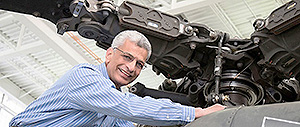Staff Reporter
Sound, Vibration Data Can Predict Maintenance

Trucking maintenance software may soon be able to predict engine trouble long before it happens, as sensors and software become more advanced, experts said.
Research being conducted for the Pentagon is advancing this goal, as a government research affiliate is working to develop systems that can predict when maintenance issues could be making an engine run a bit too hot, a bit too loud or vibrate a bit too much.
Those subtle changes produce data that can be analyzed and used to head off trouble, said Abdel-Moez E. Bayoumi, a professor of mechanical engineering who has been working on diagnosing the mechanical problems of military aircraft through a program at the University of South Carolina for 20 years. His Pentagon subjects include the Boeing AH-64 Apache helicopter and the Bell Boeing V-22 Osprey.

Abdel-Moez E. Bayoumi by University of South Carolina.
His task: Instead of planning maintenance by the calendar — or by mechanical crisis — find ways to predict trouble before it happens. In particular, figure out how to maintain engines and equipment in a manner more efficient and effective than routine inspections.
Over time, the diagnostic program at the school, now housed at the Center for Predictive Maintenance in Columbia, S.C., has expanded beyond military aircraft to include sensors suitable for truck engines and automobiles, down to components as specific as a water pump. The sensors detect changes in sounds, vibrations, temperatures, speeds or torque, Bayoumi told Transport Topics.
“The future is predictive maintenance,” he said. “Digital transformation is the name of the game. It is a culture that includes everybody involved.”
The sensors note typical acoustic sounds, normal vibrations and regular temperatures, then detect new noises or other subtle warning signs and communicate those to the maintenance team, Bayoumi said. He noted that changes in sounds or temperatures could mean a closer look is needed, before a major problem develops.
Over time, a long-term stream of data is created that Bayoumi said would be valuable to truck fleet managers, machine operators and, yes, the Pentagon. The totality of data is transmitted to a dashboard for users to observe.
Bayoumi added that the data could eventually become so predictive and sophisticated that it could communicate with managers when, for example, a gearbox was simply dirty. The center has also been able to develop software based on these sounds, noises and temperatures to allow users to call up a virtual image of the inside of a gearbox. Such data are sent to a common “bank,” Bayoumi said, so that anyone involved can see how one component is working, or how an entire fleet is performing.
In addition to the maintenance opportunities, Bayoumi noted that the technology could also be used on assembly lines and in stationary equipment.

Jack Poster by John Sommers II for Transport Topics.
Jack Poster, of the American Trucking Associations’ Technology and Maintenance Council, said fleets are working on developing predictive maintenance with a variety of partners, including Hitachi, the Japanese consumer-goods company that has been assisting an unnamed American fleet.
“(Predictive maintenance) is rushing at us like everything else because of the advanced nature of fleets,” said Poster, the manager of the council’s Vehicle Maintenance Reporting Standards division.
For now, the most advanced of the sensors and software are still in the labs, not the retail shelves. But Poster said the demand is there for simple reasons: “It boils down to time and money,” he said.
For motor carriers, a roadside breakdown is 40% more costly than the maintenance to prevent such a breakdown, Poster said.
Predictive technology promises a shift away from the worry of being stranded on the side of the road, Bayoumi noted. “You can make a decision instead of being surprised by it,” he said.
Poster added that this is the direction in which the industry is headed because even regularly scheduled maintenance can miss things, and drivers relaying information about knocks or noises from the engine can only be so helpful.
“I don’t like anecdotal data,” said Poster. “I like hard data.”



